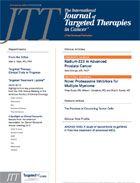Sorafenib Doubles PFS in DTC
Interim findings from a phase III study indicate that sorafenib nearly doubled PFS for patients with differentiated thyroid cancer resistant to standard radioactive iodine therapy.
Interim findings from a randomized, global, phase III study presented at ASCO 2013 indicate that sorafenib (Nexavar) nearly doubled progression-free survival (PFS) for patients with differentiated thyroid cancer (DTC) resistant to standard radioactive iodine therapy (RAI).
Sorafenib inhibits multiple kinases, including Raf and VEGF receptor kinases 1-3, which control tumor cell division and angiogenesis. The drug is FDA-approved for treatment of advanced kidney cancer and inoperable liver cancer.
In the DECISION study, 417 patients whose metastatic, RAI-resistant DTC had progressed in the past 14 months were randomly assigned to receive 400 mg of sorafenib twice daily (n=207) or placebo (n=210). Nearly all patients had metastatic disease; the median age was 63 years. Seventy percent of those in the control arm crossed over to the sorafenib arm upon disease progression. The trial’s primary endpoint was PFS. Secondary endpoints included overall survival, response rate, and safety.
Median PFS was 10.8 months in the sorafenib group versus 5.8 months in the placebo arm (hazard ratio [HR] = 0.58; 95% CI, 0.450.75;P<.0001). Tumor shrinkage of 30% or more was observed in 12.2% and 0.5% of patients in the sorafenib and placebo arms, respectively (P<.0001). An additional 42% of patients in the sorafenib arm had stable disease for 6 months or longer, for a disease control rate of 54%, compared with a disease control rate of 34% in the placebo arm. Overall survival data were not yet mature.
The most common any-grade treatment-emergent adverse events (AEs) in the sorafenib arm included hand-foot skin reaction, diarrhea, alopecia, rash/desquamation, fatigue, weight loss, and hypertension.
Other AEs were anorexia, oral mucositis, pruritis, and nausea, according to a statement released by the drug’s manufacturers, Bayer HealthCare Pharmaceuticals and Onyx Pharmaceuticals, which cooperatively supported the study. Treatment-emergent AEs led to discontinuation in 18.8% of patients who received sorafenib, compared with 3.8% of patients who received placebo.
Researchers are conducting further analyses of the trial to look for biomarkers to identify patients likely to benefit from sorafenib earlier in the course of the disease.
If approved, sorafenib would become the first new drug in 40 years for the treatment of this rare and aggressive form of thyroid cancer. However, additional treatment options will also be needed for second-line therapy and beyond, since DTC eventually progresses despite sorafenib treatment. Researchers are currently investigating MEK and mTOR inhibitors for this population, along withBRAF-targeted therapy.
The DECISION data will form the basis for a supplemental New Drug Application planned for mid-year 2013, with additional submissions to follow globally.
Brose MS, Nutting C, Jarzab B, et al. Sorafenib in locally advanced or metastatic patients with radioactive iodine-refractory differentiated thyroid cancer: The phase III DECISION trial.J Clin Oncol

Survivorship Care Promotes Evidence-Based Approaches for Quality of Life and Beyond
March 21st 2025Frank J. Penedo, PhD, explains the challenges of survivorship care for patients with cancer and how he implements programs to support patients’ emotional, physical, and practical needs.
Read More
Anticipating Novel Options for the RAI-Refractory DTC Armamentarium
May 15th 2023In season 4, episode 6 of Targeted Talks, Warren Swegal, MD, takes a multidisciplinary look at the RAI-refractory differentiated thyroid cancer treatment landscape, including the research behind 2 promising systemic therapy options.
Listen